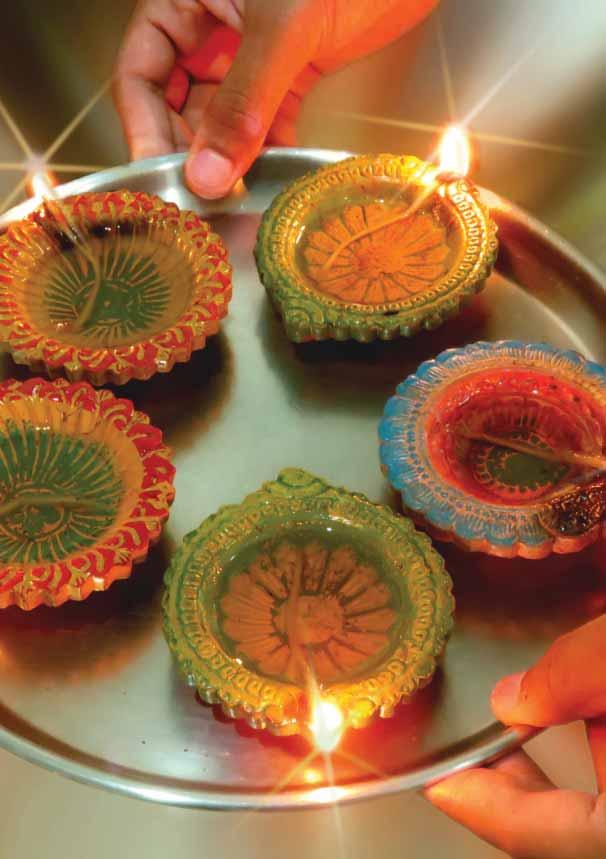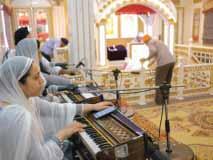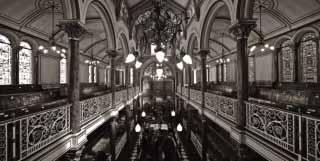
10 minute read
Music in faith
Music plays a vital part in the ceremonies of many faiths. As we approach the big winter and end-of-year festivals, Clare Stevens fi nds out how musicians and the worshipping communities they serve have been affected by the pandemic
Above: Clare Stevens Photo: Alex Ramsay
We understand this winter may be diffi cult for some members; read our next feature which outlines the state benefi ts that you may be entitled to
Left: Candles lit for Diwali Photo: iStock The church of St Bride’s, Fleet Street in the City of London is one of Sir Christopher Wren’s masterpieces, its tiered spire a unique landmark on the Thamesside skyline. Blown to smithereens in the Blitz, the nave of the church was faithfully rebuilt after the war and its immaculate interior has been the venue for countless christenings, weddings and memorial services ever since. In normal times its calendar is packed with concerts and carol services, and its professional choir is one of the country’s fi nest, with a particular reputation for being able to sing music in a very wide range of styles. Whether a wedding couple wants to sign the register to the accompaniment of a Palestrina motet or a song from Frozen, St Bride’s Choir will provide an impeccable, stylish performance.
When this year’s fi rst national lockdown was announced at the end of March, the Church of England advised that all its churches should be closed and regular services suspended. Even when they were given the green light to reopen for private prayer by clergy and individuals at the beginning of July, provided that appropriate hand sanitising, deep cleaning and physical distancing measures were in place, it was several weeks before congregations could gather for worship and even longer before fi rst professional and then amateur choirs were permitted to return. That singing is allowed at all in worship settings is thanks to the early results from scientifi c research into the transmission of COVID-19 via aerosols and droplets, particularly the project led by consultant laryngologist Declan Costello, who is also a semi-professional singer. Indications were that with protective measures in place, singing at a moderate volume is no more dangerous than speaking.
‘Protective measures’ for St Bride’s mean that when the choir convenes for Sunday morning services or to record music for the church’s regular livestreams, the elegant nave is punctuated by large perspex screens so that each singer occupies their own personal space. ‘They have treated it as a workplace, and it feels very safe,’ says Emily Owen, a soprano with the choir. ‘We feel really valued by the clergy and congregation, and they have done their best to keep paying us through the pandemic.’
In recognition of this support, the St Bride’s musicians gave a free online recital of choral and organ works by Bach at the beginning of September; the interval featured interviews with some of the singers, who explained the importance of professional church choirs to the ecology of the music world. Some of the best-known soloists in the country will drive back to London after an oratorio performance in a provincial city in order to meet their Sunday morning obligation at St Bride’s or other similar churches. In normal circumstances this would be supplemented by additional fees for weddings, memorials and other special services such as those hosted on behalf of the City of London livery companies. ‘St Bride’s provides a third of my income,’ admits tenor Matthew Long in the fi lm.
Emily Owen recently felt confi dent enough about the stability of her singing career to give up the music administration roles that she had undertaken since graduating to support it. She and her partner, also a singer, had bought a house and booked their wedding for this summer; but the wedding has had to be postponed and COVID-19 has dramatically reduced their income.
When we spoke in September, however, Owen was feeling more optimistic than she had done for many months, as her diary had begun to fi ll up again. She also sings at the West London Synagogue, and had spent much of the month recording music for use in its broadcasts of High Holy Day services around the Jewish New Year, Rosh Hashannah, and Day of Atonement, Yom Kippur. ‘You don’t have to be Jewish to sing in a synagogue choir,’ she explains. ‘In fact it is better if you are not, because you don’t have the confl ict about working on the Sabbath.
Our religious beliefs also link into our identity; read our feature on page 14, which explores this topic further
Below: Daniel Hyde conducts the Choir of King’s College, Cambridge in last year’s Festival of Nine Lessons and Carols (photo taken prior to COVID-19 lockdown) Photo: Courtesy of King’s College Cambridge
‘We sing psalms with responses and throughcomposed songs based on the psalms; there’s a lot of Victoriana, some baroque works in Hebrew, and new works, often written by our Director of Music, Christopher Bowers-Broadbent. There is actually a huge repertoire, but most of the pieces are very short. For the September High Holy Days we recorded 650 individual items!’
As with the Christian churches, there has been a huge amount of variation in how different congregations and branches of the Jewish faith responded to the pandemic. The arts journalist Norman Lebrecht is involved in leading services at two London synagogues, and describes the situation in the autumn as ‘chaos … The Reform Synagogues are not opening their buildings, just Zooming Rabbis from home,’ he says. ‘The Orthodox congregations have reopened, but with severely restricted admittance, just 40-50 people with no choir. I led one of the services on Yom Kippur, as I usually do, and was told I didn’t need a mask and would be allowed to sing. Everyone else was masked and only permitted to hum along.’
For many Christian worshippers, the ban on congregational singing has been particularly hard to endure. In traditional Anglican cathedral and parish church settings, the expression of faith through music depends upon a dialogue between complex anthems and service settings sung by the choir and the familiarity of congregational hymns in which everyone can join. In evangelical congregations and non conformist churches such as Methodist, Baptist or Presbyterian, hymns and worship songs are the bedrock of services. In my own rural parish in the Welsh Marches, the Rector says that not being able to sing the familiar Harvest hymns with members of his fi ve congregations, many of whom are from farming families, has been a particular deprivation.
The answer for some evangelical Christian churches has been to prioritise online worship, featuring fi lmed

performances, often very atmospheric, by distanced worship bands, broadcast on YouTube with subtitles so that members of their congregations can join in at home. Cathedrals and parish churches that had already been webcasting or streaming some of their services found themselves at an advantage at the start of the pandemic as they had a bank of archive recordings to draw on when they began to put together online worship. Many are now routinely streaming weekday as well as Sunday services, so that they can be attended by both a small in-person congregation – sometimes ticketed so that distancing can be ensured – and many more ‘virtual’ participants, often watching from the other side of the world.
Offering virtual worship seems to be the norm for other faiths too, based on a random survey of the websites of mosques, Sikh gurdwaras and Buddhist temples around the UK; a YouTube offering of ‘Happy Birthday’ by a children’s group from the Fo Guang Shan Chinese Buddhist Temple in Soho to one of their worship leaders was particularly touching. Even though the instrumental music and solo singing that plays such an important part in Indian faiths would pose a very limited risk, it seems that places of worship are cautious about admitting large groups of people to their buildings, which are generally open for private prayer only.
One of the diffi culties faced by many Anglican cathedrals in the early months of the pandemic was that their directors of music, organists and the professional adult singers who provide their alto, tenor and bass parts were furloughed, so were not able to be part of the discussions about possible alternatives to their normal liturgical offerings. Fortunately they had eloquent advocates among those who were not furloughed, such as Robert Sharpe from York Minster and David Price from Portsmouth Cathedral, who were closely involved in helping to plan the church’s longer-term strategy, working with the Archbishop of Canterbury’s team and with the Royal School of Church Music.
Price and his colleagues at Portsmouth were among the most pro-active and creative in fi nding ways of keeping morale going during lockdown by staying in touch with their choristers and choral scholars, giving them opportunities to perform together on Zoom and marking as best they could what would normally have been landmark moments – Lent, Easter and all the celebratory summer events for those who were leaving. They were among the fi rst to return, spread around the cathedral rather than packed into their choirstalls, when restrictions were eased; and they were the fi rst cathedral choir to do a live broadcast of Choral Evensong on BBC Radio 3.
‘We were able to sustain our activity really well for a term,’ says Price, ‘but it was a coping strategy for an emergency. Singing into a microphone at home is not rewarding for children, they need to have other people

round them to learn from and they need the routine of practices and services and the fun of free time spent in each other’s company.’
In Scotland and Wales COVID-19 regulations around public worship have been even stricter – the choristers of Newport Cathedral, South Wales, began this term by holding their practices outdoors, and the only musicians allowed to perform in the cathedral were solo singers and instrumentalists. In Scotland, no singing at all was permitted at the time of writing and directors of music had been told it might be Easter 2021 before any form of choral activity could resume.
As this magazine lands on your doorstep at the beginning of November we will be facing the prospect of the Hindu Festival of Light Diwali, the Jewish winter festival of Hannukah and the Christian seasons of Advent and Christmas with very limited musical celebrations. David Price feels that with the proper preparation and precautions in place, meaningful worship will be possible – he’s currently considering the prospect of eight carol services in order to accommodate as many people as possible in much smaller congregations.
In Cambridge, the world’s most famous choristers are wearing matching purple masks as they take their daily walk from King’s College School where they are boarders to King’s College Chapel where they rehearse. Will the Festival of Nine Lessons and Carols take place as usual on Christmas Eve? At the time of

writing everyone hopes so, but the announcement was made in August that no tickets would be available for the general public. Christmas without carols may seem unimaginable, but unless the pandemic subsides dramatically between now and the middle of December, sadly we may all be singing along at home to the broadcast from King’s rather than raising our voices together in our local churches.
Clare Stevens is a freelance writer and editor
Declan Costello: voicedoctor.co.uk St Bride’s Church: stbrides.com Emily Owen: emilyowensoprano.co.uk West London Synagogue: wls.org.uk Fo Guang Shan Buddhist Temple, London: londnfgs.org.uk
For information about choristerships at King’s College Cambridge, Portsmouth Cathedral or Newport Cathedral please see their websites: kings.cam.ac.uk newportcathedral.org.uk portsmouthcathedral.org.uk yorkminster.org Choir Schools Association: choirschools.org.uk Royal School of Church Music: rscm.org
Top left: Musicians in a Sikh temple (photo taken prior to COVID-19 lockdown) Photo: Abie Davies
Above: Middle Street synagogue Brighton Photo: Pixabay
Give the gift of ISM membership this Christmas
Give the musicians in your life the security and peace of mind that comes with being part of a professional body. ISM membership makes the perfect gift for any music student or professional. Student membership is just £15, and for recent graduates or those with 10 or fewer years’ experience, ISM early career membership is just £50. Alternatively, for established music professionals with more than 10 years’ experience, you can help protect and enhance your colleague’s career with ISM full membership for just £181. To order a gift membership, simply call 020 7221 3499, Monday – Friday, 9.30am – 5.30pm. Find out more at ism.org/gift-membership









